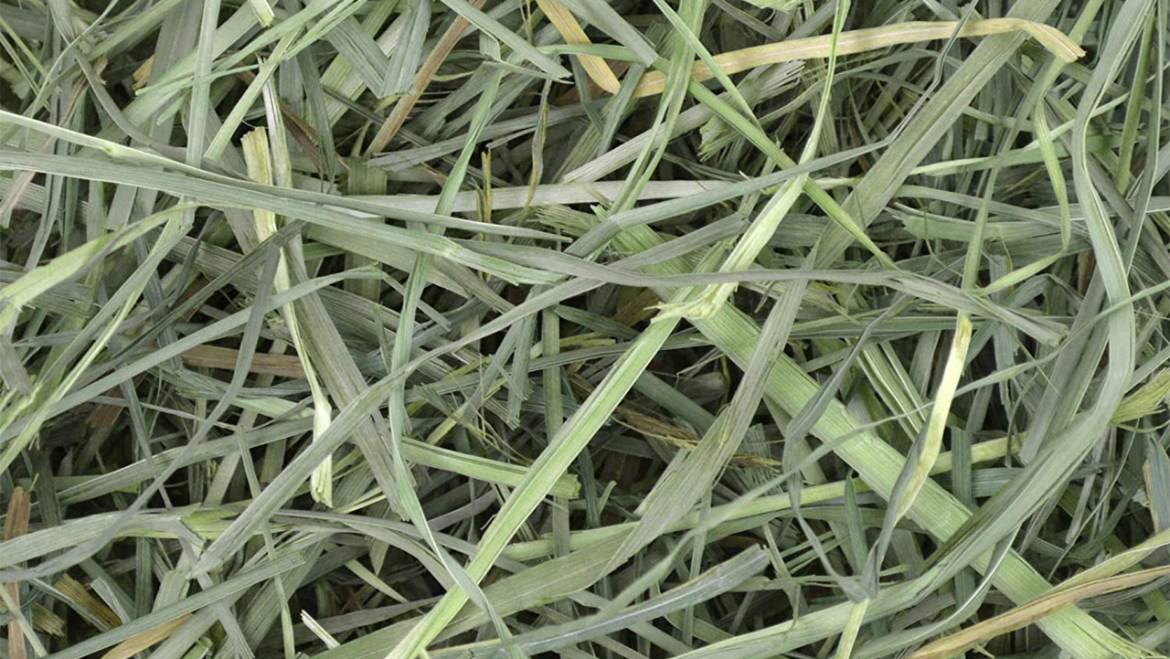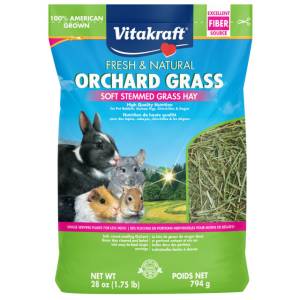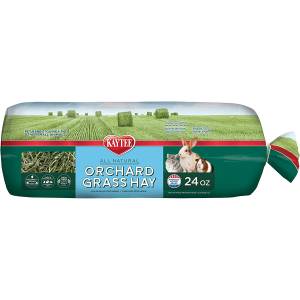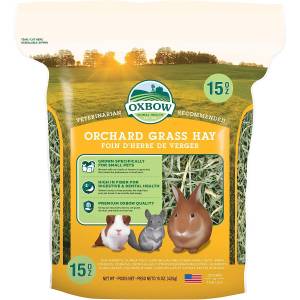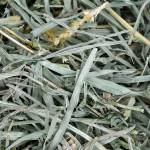Orchard grass hay is a type of grass hay that is often recommended as a dietary staple for chinchillas. It is high in fiber and low in protein, making it an excellent choice for promoting digestive health and preventing hairballs. In this article, we will cover the benefits of orchard grass for chinchillas, its nutritional breakdown, top brands, and potential drawbacks.
What is Orchard Grass Hay?
Orchard hay is a type of grass hay that is commonly fed to small herbivores like rabbits, guinea pigs, and chinchillas. It is made up of a mixture of grasses, including orchard grass, which is known for its sweet, mild flavor and soft texture. Orchard grass is a nutritious option for small herbivores, as it is high in fiber and low in protein, fat, and calcium. It can provide essential nutrients to help maintain healthy digestion and dental health in herbivores. Orchard grass hay can vary in color and texture depending on the region where it is grown and how it is harvested, but high-quality orchard hay should be green and fragrant with a soft texture that is easy for animals to chew and digest.
Benefits of Feeding Orchard Grass to Chinchillas
Orchard grass has several benefits for chinchillas, including:
- High in Fiber: Orchard grass hay is an excellent source of fiber, which helps promote healthy digestion and prevents gastrointestinal problems.
- Low in Protein: Chinchillas require a low-protein diet, and orchard grass provides just the right amount of protein to meet their needs without causing health problems.
- Prevents Hairballs: Chinchillas are prone to hairballs, which can be dangerous if left untreated. Orchard hay helps prevent hairballs by promoting healthy gut motility.
Drawbacks of Feeding Orchard Grass Hay to Chinchillas
While orchard grass hay is an excellent source of nutrition for chinchillas, it does have a few drawbacks. One potential issue is that orchard hay can be less consistent in quality than other types of hay, which can make it more challenging to find high-quality hay. Additionally, orchard grass can sometimes be less palatable to chinchillas than other types of hay, which can lead to decreased appetite and potential nutritional deficiencies.
How to Choose the Best Orchard Hay
When choosing orchard hay for your chinchilla, it’s essential to choose a high-quality product that provides the right balance of nutrition and freshness. Here are some things to consider when choosing the best orchard grass for your chinchilla:
- Check the Label: Look for a brand that clearly lists the hay’s origin and nutritional content.
- Smell the Hay: High-quality orchard grass hay should have a sweet, fresh aroma. If the hay smells musty or moldy, it may not be fresh or of good quality.
- Inspect the Hay: Look for orchard grass hay that is green and leafy, with a soft texture. Avoid hay that is brown or dusty, as it may be old or contaminated.
- Check for Dust and Debris: Before feeding the hay to your chinchilla, shake it out to remove any dust or debris that may be present.
By choosing a high-quality orchard hay and storing it properly, you can ensure your chinchilla gets the best possible nutrition and enjoy a long and healthy life.
Top Brands of Chinchilla Orchard Grass
Some of the top brands of orchard grasses for chinchillas include:
When choosing a brand of orchard grass hay for your chinchilla, it’s important to select a reputable supplier that sources its hay from trusted growers. Each of the brands mentioned above is known for their high-quality products and is a good option for chinchilla owners looking to provide their pets with a healthy and balanced diet.
How to Store Orchard Grass Hay
Proper storage is essential to maintain the nutritional quality and freshness of orchard hay. Here are some tips for storing orchard grass for chinchillas:
- Keep it Dry: Store orchard hay in a dry, cool place to prevent moisture from accumulating and causing mold or mildew.
- Use an Airtight Container: Use an airtight container to store orchard grass hay, as it will prevent moisture, dust, and pests from getting into the hay.
- Store it in a Dark Place: Exposure to sunlight can cause orchard grass hay to lose its nutritional value and freshness. Therefore, it is best to store the hay in a dark place, away from direct sunlight.
- Store in Small Batches: If you buy orchard grass hay in large quantities, it’s best to store it in smaller batches to maintain its freshness.
By following these storage tips, you can help ensure your chinchilla gets the best possible nutrition from their orchard hay, promoting their overall health and well-being.
Nutritional Breakdown of Orchard Grass Hay
Orchard grass has the following nutritional breakdown:
- Crude Protein: 7-12%
- Crude Fat: 1-2%
- Crude Fiber: 30-35%
- Moisture: 10%
Nutritionally, orchard grass hay is a great choice for chinchillas as it is high in fiber, which aids in digestion and maintains gastrointestinal health. It also contains an adequate amount of protein, carbohydrates, vitamins, and minerals required for a balanced chinchilla diet. Moreover, the moisture content in orchard hay is usually relatively low, making it a good choice for promoting dental health and reducing the risk of dental problems in chinchillas.
In conclusion, orchard grass hay is an excellent choice for chinchillas as a dietary staple. It is high in fiber, low in protein, and promotes healthy digestion while also preventing hairballs. While it may have some potential drawbacks, such as variability in quality and palatability, overall, orchard grass is a great option for chinchilla owners looking to provide their pets with a healthy and balanced diet. When choosing a brand of orchard hay, it’s essential to choose a reputable supplier that sources its hay from trusted growers to ensure the highest quality product for your chinchilla. By incorporating orchard grass hay into your chinchilla’s diet, you can help ensure their optimal health and well-being.

